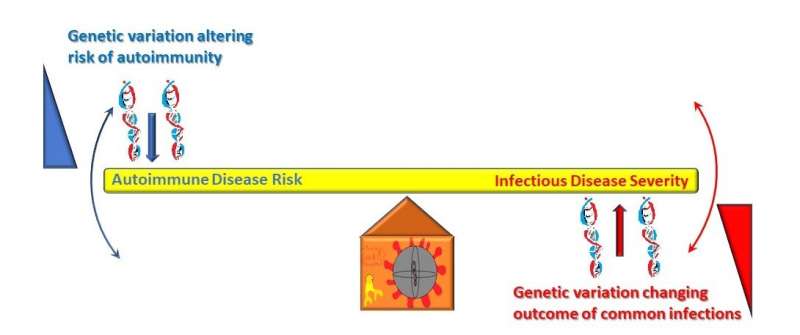
Some genetic variants may put people at risk of autoimmune diseases while conferring protection against the outcome of viral infection. A study published November 3 in the open access journal PLOS Genetics by David Morris and Timothy Vyse at King’s College London, U.K., and colleagues suggests that genetic predisposition for systemic lupus erythematosus (SLE) may be protective against severe COVID-19 infection.
Scientists have observed a correlation between the genes associated with severe COVID-19 and those with SLE. In order to locate associated genes and gain insight into the shared genetic effects, researchers compared the genetics of severe COVID-19 with those of SLE using multiple analyses, including an approach that can focus on specific areas of the genome. The authors then accessed data on genes and the structure of the genome obtained from several biomedical databases to understand the biology of the shared genetics.
The researchers found that TYK2, a gene associated with both SLE and severe COVID-19 provides protection against viral infection, but increases risk for autoimmune disease. Future studies will be needed to fully understand the genetic relationships between COVID-19 and other diseases. The study has its limitations, such as the overrepresentation of European ancestry in the datasets used to perform the analyses.
According to the authors, “Our results indicate that there are shared genetic effects between the autoimmune disease SLE and the clinical consequences of COVID-19. The locus with the most evidence of shared association (TYK2) is involved in interferon production, a process that is important in response to viral infection and known to be dysregulated in SLE patients. In seeking to uncover the mechanisms underlying these relationships it was apparent that the functional effects of the risk and protective genotypes are complex.”
Dr. David Morris and Professor Timothy Vyse, who led the study, add that “this is an exciting result made possible by the large genetic studies in COVID-19 and lupus, and opens the door to our understanding of how the biology of the immune system is calibrated to protect us against infection from viruses and other infectious agents, but at the risk of developing autoimmune disease.”
More information:
COVID-19 and systemic lupus erythematosus genetics: A balance between autoimmune disease risk and protection against infection, PLoS Genetics (2022). DOI: 10.1371/journal.pgen.1010253
Journal information:
PLoS Genetics
Source: Read Full Article
